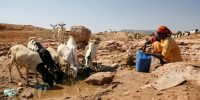IBM scientists in Kenya have unveiled a water management service platform (WMaaSP) to address the needs of approximately three million Kenyans living in the remote northern regions of the country.
The platform is part of the Kenya Resilient Arid Lands Partnership for Integrated Development (Kenya RAPID) under the coordination of the Millennium Water Alliance (MWA).
The IBM Cloud-hosted platform was developed in collaboration with various private and public sector partners, as well as representatives of the local governments in the northern counties of Kenya. The project was presented for the first time at the World Water Week conference in Stockholm, Sweden.
With a population of approximately 46 million, 41 percent of Kenyans rely on water sources such as ponds, shallow wells and rivers, a challenge especially in rural areas. Only nine out of 55 public water service providers in Kenya provide a continuous water supply.
Now, as part of the Kenya Resilient Arid Lands Partnership for Integrated Development (Kenya RAPID), IBM Research-Africa has created a water management platform to address the needs of these arid lands without access to safe water.
“The Kenya RAPID programme combines assets and experience of development actors, private and public institutions by leveraging their capital and investments, innovation and access to markets to address complex problems of inadequate water access, sanitation and poor governance of natural resources in the Arid and Semi- Arid Lands (ASAL) counties of Garissa, Isiolo, Marsabit, Turkana and Wajir in Kenya,” says Doris Kaberia Chief of Party for Kenya RAPID & Kenya Programs Director at Millennium Water Alliance.
The key product of IBM’s research is a software platform known as the Water Management as a Service Platform (WMaaSP), which provides decision support capabilities to county water officials and other partners.
The IBM Research-built platform can enable decision making by predicting water demand based on population trends, ground and surface water supply, climactic patterns and land use. This Water Management as a Service Platform (WMaaSP) is accessible on both web and mobile as an app.
The platform, which uses sensors to provide supply and demand patterns based on groundwater extraction data, can also help water service providers significantly reduce their non-revenue water (water that is “lost” before it reaches the customer through leaks, theft or metering inaccuracies).
“Through the support of IBM’s WMaaSP decision making tool, water service providers such as Londwar Water and Sewarage Company in Turkana or Dirib Gombo water scheme in Marsabit have significantly reduce their non-revenue water. For example, Dirib Gombo’s non-revenue water has reduced from over 40% to 30% and their revenues from Tarrif collection has also tripled ”, says Doris Kaberia, Chief of Party & Kenya Programs Director at Millennium Water Alliance.
The traditional approach to coping with water challenges, especially in water-scarce, arid environments has been to increase supply by investing unsustainably in decentralized water infrastructure (such as dams and boreholes) to meet growing domestic, agricultural and industrial demands.
Local governments and donor organizations typically finance expensive water infrastructures which are then handed over to communities with limited capacity to maintain them. Water managers also lack visibility into the location, status and performance of the water infrastructure, leading to an inability to respond to user feedback and a limited ability to provide repair and maintenance.
“For instance, if a citizen reports an issue to the sub-county water officer, the officer can use the mobile app to quickly locate the issue and assign the complaint to a repair officer who then inspects the issue and files a site report detailing the issue and/or required resources, also using the app. Once the repairs are complete, the assigned officer files a repair report detailing what was fixed to close the issue through the mobile app,” says Dr. Nathan Wangusi, the Principal Project Investigator from IBM Research – Africa.
SweetSense, a startup that works closely with IBM Research, is also installing sensors on electric water pumps to measure rates of utilization and infer levels of functionality to aid in the dispatching of crews for timely repair and maintenance for more efficient management of decentralized water infrastructure.
The platform can help water managers make decisions by predicting water demand based on population trends, ground and surface water supply, climactic patterns and land use. The platform also provides the following features:
• a database and interactive map for maintaining information about inventoried water points – or locations where water can be accessed throughout the counties.
• a historical record of water drawn from boreholes, breakages and repairs that are monitored by SweetSense.
• a view into the 3R and groundwater potential throughout the study region.
• a detailed view into water governance within each of the counties, associated responsibilities and contact information.
IBM has also established a Rotational Program with the counties which is focused on sharing software development skills with the county ICT representatives as these skills pertain to aspects of WMaaSP. The Program will allow the county representatives to work with IBM Research’s Engineering Team to learn first-hand how WMaaSP is designed and how it is being iteratively developed.
For more than seven decades, IBM Research has defined the future of information technology with more than 3,000 researchers in 12 labs located across six continents. Scientists from IBM Research have produced six Nobel Laureates, 10 U.S. National Medals of Technology, five U.S. National Medals of Science, six Turing Awards, 19 inductees in the National Academy of Sciences and 20 inductees into the U.S. National Inventors Hall of Fame.
The IBM Cloud has been built to help you solve problems and advance opportunities in a world flush with data. Whether it’s data you possess, data outside your firewall, or data that’s coming, the IBM Cloud helps you protect it, move it, integrate it and unlock intelligence from it — giving you what it takes to prevail in a competitive market.

